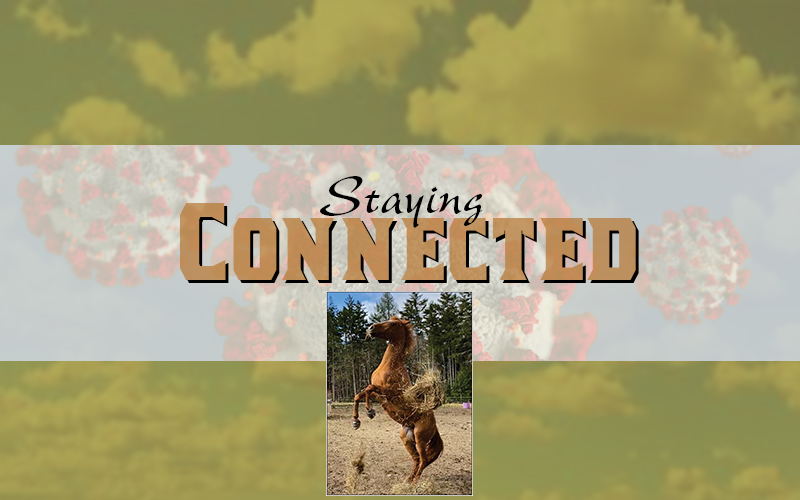Charlotte Robinson knows horses. She’s been riding since she could sit on a horse. Her grandmother, who started one of the first therapeutic riding centers in the U.S. (HALTER in South Carolina), gave her the horse-loving bug.
Now, not only does Robinson board her own horse at a stable in Ferrisburgh, where she can ride all winter long in the indoor ring, but she has 11 horses living on her Warren farm. This is where she taught her three children how to ride, where she spends the summer hosting riding camps for kids, and where she’s trained horses born on the farm.
When the spread of COVID-19 led Governor Phil Scott to issue his Stay Home, Stay Safe order, some stables decided to cut off contact to the outside world, even to those who just wanted to see their own horses.
Eventually, after the governor deemed care of livestock an essential practice, her Ferrisburgh stable opened up, under strict conditions. Robinson was allowed to sign up for two-hour slots to ride and do chores. This slotted time involved coronavirus cleanliness protocols: disinfecting tack and brushes after use, and wearing gloves and a mask at all times.
NO VISITS
At her own barn, Robinson initially took a strict no-visits approach with her two boarders. “We were really strict about it because we have a disabled adult who lives with us who has a compromised immune system,” said Robinson, explaining why she told the boarders to stop visiting their horses. “They were fine with it.”
Like the owners of the stable in Ferrisburgh, Robinson is now loosening the metaphorical reins on her no-visits policy. One teenager who boards a horse at Robinson’s barn took a lesson from Robinson last week. The lesson worked out, in terms of social distancing, because the teen can tack up on her own. Additionally, Robinson’s boarders have their own equipment, including pitchforks and brooms, all of which are now labeled to ensure nobody is accidentally grabbing a broom hot off another’s hand.
While Robinson is now letting her self-sufficient boarders visit her barn, she doubts that she’ll be able to host a summer camp this year, seeing as many of her campers are young and need hands-on help handling horses. Moreover, many of these young riders don’t have their own equipment, and Robinson is reluctant to let campers freely borrow and share.
RISK OF EXPOSURE
Another dissuading factor in hosting a summer camp has to do with the risk of exposing Vermonters to out-of-state travelers, said Robinson. In a typical camp at Robinson’s barn, 60 percent of the campers are from The Valley and 40 percent from out of state. “Just yesterday I got two calls and two emails from people that live out of state, who have seen that the governor has changed things and are wondering if their kids can come ride here,” she said. When Robinson asked two Bostonian parents if they planned on quarantining their kids before camp, they said no. They told Robinson that they had been living low key in Boston and felt that quarantining wasn’t necessary for them.
“I had to turn them down,” said Robinson. “I’m a little worried. Because, since Vermont has done a great job with this and because we are so safe and the numbers are so low, of course, people want to come here.”
Still, the prospect of a summer without riding camp is a sad one for Robinson. “I feel like kids need something. School is canceled and so many camps have been canceled already,” she said.
Additionally, without summer camps, Robinson will lose the financial fuel that allows her to feed her 11 horses all winter long. “Generally, my program sustains feeding all of my critters,” said Robinson. “I make all my money for winter hay in just a couple of months in the summer. So I’ll take a hit there.”
Although Robinson is worried for the equine community, as well as others suffering in the face of the coronavirus pandemic, she’s staying positive by helping the community, spending time with her family and enjoying long rides. “I’m doing my part to try and buy meals for people, to buy gas cards and grocery cards and try to help out in any way I can. That makes me feel positive,” said Robinson. “And I’ve got my whole family here. And I’ve got my horses. I’ve got my grandkids. I’m so lucky.”







